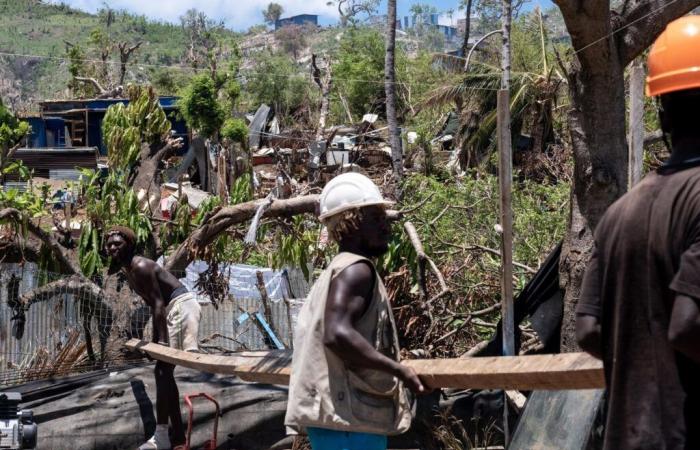At dawn, in the Kaweni slum, it is the sound of hammer blows against the metal sheets that wakes up the neighborhood. For more than two weeks, the metallic melody has been repeated tirelessly every morning. The reconstruction of homes is one of the priorities of families who have lived here, some for several decades. The passage of Cyclone Chido on December 14 left the island devastated and the most precarious neighborhoods were the first to be affected.
Around cars whose windshields have been shattered, Bosco, Naïs and Kassim are busy under the blazing sun. The day before, the same three were cutting down a large tree that had shattered on the ten or so vehicles in the garage. “I have been working here since 2019, begins Bosco by assembling two beams, you have to get back to work if you want to survive. » On this January 1st, on the heights, the bangas – these small tin houses – are growing back at dizzying speed. “I started by rebuilding my house, of course, at least for the children, then I attacked the garage,” he said, watching the workers who accompanied him work.
At Bosco as elsewhere, nothing is really finished at the moment. “There are no sheets of metal, there are no nails, and at night there is no electricity, so no light to continue rebuilding. » A few dozen meters away, another merchant has not yet started to rebuild. Abdou Chakour is a carpenter, his workshop was pulverized by the cyclone. Only the framework held. Her house is almost finished. “It took time to find materials, especially wood and sheet metal,” underlines the craftsman. After thirty-nine years on the island, he starts from scratch. “I didn’t have insurance for the equipment…”
“Rebuilding Mayotte in two years is really not feasible”
All around, there is the frenzy of major construction sites. In front of the mosque, the women of the neighborhood organized themselves to cook and distribute a meal to the people who need it most. The men go back and forth, iron on their heads. Aboudou is Malagasy, he has lived in Kaweni for several years. His house is coming out of the ground, little by little, with the means at hand. Here, many are concerned about the state's desire to prohibit the reconstruction of bangas. “Basically, I agree, we must put an end to the slums. But we need housing! Otherwise, where will we go when we are deported? »
Everyone is asking the same question. Naïzma shows the little that she and her husband were able to rebuild on the land where they lived before the cyclone. A wooden door, a thin frame, and a few sheets of corrugated iron. Here, there is no plywood, as before, to separate the rooms where the six children sleep. “It’s very difficult to find large boards at the moment,” confides the mother. Inside, still no mattress. On the doorstep, Moussa and Moussaïdine, his two sons, dream of a new life. “An apartment or a house in Kaweni would be great! “, exclaims the first.
Not far from there, washing clothes in a basin, Oindidi abounds: “For the moment, we prefer to rebuild, because the accommodation lasts six months and then we are thrown out. Let us be offered real accommodation, and we will pay for it like everyone else,” she blurted, rolling her eyes. “But rebuilding Mayotte in two years is really not feasible. »
“What do we ultimately want to talk about, homes, or their inhabitants? »
For architects, the upcoming construction site on the island is a real headache. If Prime Minister François Bayrou announced, during his visit on December 30, that he wanted “ban and prevent the reconstruction of slums”, however, he did not propose an alternative. The day after December 14, many practices mobilized their professionals to carry out emergency diagnostics. Priority to educational establishments hastily transformed into emergency accommodation centers, because almost half of them have been totally or partially destroyed.
Hedia Jelassi is an architect at the town hall of Mtsamboro, in the northwest of Grande-Terre. For the project manager for the fight against substandard housing and a specialist in major risks, the passage of the cyclone highlighted the complexity of the territory.
“Exposure to natural risks affects everyone in Mayotte. If people first think of tin houses, in reality some of the permanent houses can also be considered as unsanitary housing. begins the architect. The cyclone did not spare any construction. “The State has announced that it wants to ban sheet metal housing, but it has already almost finished being rebuilt,” she continues, questioning herself: “What do we ultimately want to talk about, homes, or their inhabitants? This announcement is clear, it pleases elected officials, but no one really believes it. »
Political will, often coupled with the fight against irregular immigration. In 2023, Interior Minister Gérald Darmanin launched Operation “Wuambushu” on the 101st French department, followed by “Wuambushu 2” a year later.
Slums were then razed and some residents temporarily accommodated. “Having a roof is a fundamental right, recalls Hedia Jelassi, but here, the number of available housing does not increase and the aid is reduced from year to year. How can the State announce that it wants to fight against slums if it reduces the resources of municipalities seeking to eliminate substandard housing? In Mayotte for example, only 113 social housing units were built in 2023.”
The problem of human resources in construction
If the question of materials arises, it is above all that of human resources which leaves professionals in the sector perplexed. Because the island produces its own concrete, raw earth is making a comeback and bamboo experiments are promising. But the lack of qualified engineers and manpower raises fears of an extension of already short deadlines.
“While large companies have recognized expertise, smaller local companies are sometimes struggling. They often lack human resources, cash flow and sometimes skills on certain projects, explains Hedia Jelassi. However, we want to work with them, that's normal if we want to develop the island. But I find it difficult to see the State entrusting colossal work to small companies which have not always demonstrated their efficiency. »
Despite the ambitions of the “Mayotte standing” plan, “if the State had wanted to act, it would have done so the day after December 14, quips the specialist, because Chido succeeded where Wuambushu failed, namely the destruction of the majority of the slums.” Instead, the view of Kaweni Heights has already returned to almost the same as before the cyclone.
—–
Emergency law presented next week
An emergency bill for Mayotte, integrating several short-term measures of the “Mayotte standing” plan, will be presented next week to the Council of Ministers, and not this Friday, January 3 as initially planned, Matignon announced on Thursday. This will not change the timetable for its examination in Parliament, which resumes its work on January 13.
A “refoundation law-program”, other text for longer term measurements, must be “prepared and designed with the elected officials of Mayotte” and will be “definition within three months”, according to the Prime Minister's entourage.
According to a reportpublished Sunday December 29 by the prefecture, Cyclone Chido, the most devastating in Mayotte in ninety years, left at least 39 dead and more than 5,600 injured.






